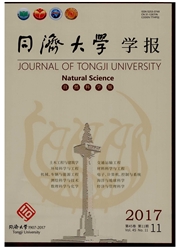

 中文摘要:
中文摘要:
按照《金属材料低温拉伸试验方法》(GB/T13239—2006)的要求制作拉伸试件,对3种钢筋(热轧带肋钢筋HRB335、HRB400和热轧细晶粒钢筋HRBF400)共84根试件在-180℃~-80℃温度下的力学性能进行单轴受拉试验,研究低温下钢筋力学性能的变化规律.结果表明,随着温度的降低,钢筋的应力-应变曲线形状及极限应变基本不改变,但屈服平台长度、屈服强度、极限强度、强化应变增加.根据试验结果,给出了低温下钢筋屈服强度、极限强度、强化应变等力学特征值随温度的变化规律,进而可建立超低温下钢筋的应力-应变关系.
 英文摘要:
英文摘要:
Mechanical properties of three kinds of 84 steel bars(HRB335,HRB400,and HRBF400) were studied through tests under low temperature ranging from-180℃ to-80℃.Tensile specimens were prepared according to national code of GB/T 3239—2006.Through tensile tests,the mechanical behaviors of these rebars under low temperature were studied.Analysis of the test results reveals that the shape of the stress-strain curve and the ultimate strain for steel bars may not be changed by the temperature,but the yield plateau,the yield strength,the ultimate strength,and the hardening strain of steel bars will increase with the decrease of the temperature.Based on the test results,regression equations of the characteristic values reflecting mechanical properties of rebars in super-low temperature environment were established,and then the stress-strain relationship of steel bars at super-low temperature was proposed.
 同期刊论文项目
同期刊论文项目
 同项目期刊论文
同项目期刊论文
 期刊信息
期刊信息
